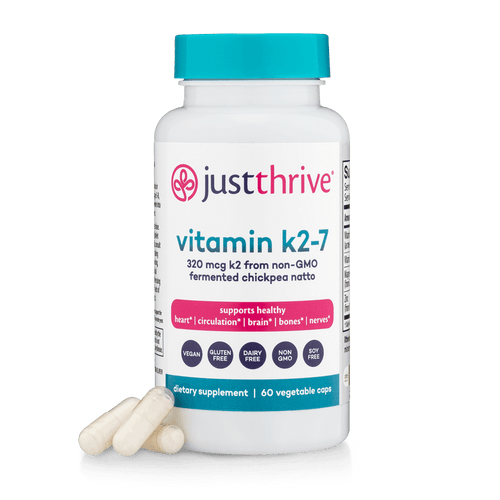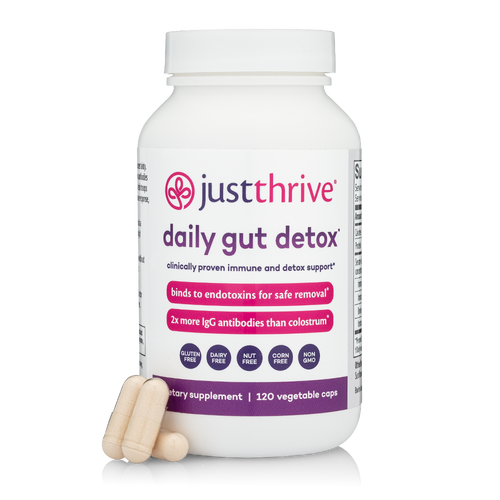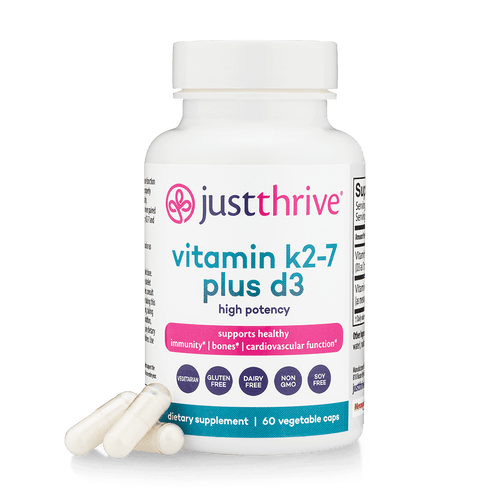Your bones are built and strengthened with calcium. As you age, your bones need calcium to continue to stay strong. So, it seems logical that more (or at least adequate) calcium should equal healthy and strong bones.
Calcium is abundant in all our food. In fact, it's the most common of all the minerals in our environment! And yet, as we age, we often end up with weak bones, weak teeth, and curvature of the spine. (Over 50% of the US adult population ages 50 years is at risk for Osteoporosis.)
It doesn’t make sense: If calcium is so easy to get, and we can get plenty from our diet, why do so many of us end up struggling?
The reason might surprise you:
Just because you’re consuming calcium doesn’t mean it’s going to end up in your bones. And here’s where it gets tricky: Calcium that doesn't go into your bones can do a lot of damage to the soft tissues in your body, like your heart and blood vessels.
In fact, without proper management, the calcium you’re getting from food and supplements can actually do more harm than good.
That’s why, if you want strong bones, you can’t rely on calcium alone. To ensure proper calcium usage, your body needs help directing this essential mineral to the places where it’s needed (and keeping it OUT of the places it doesn’t belong).
Calcium Doesn’t Work (Without This)
Calcium is an essential mineral, but it can be hard for your body to absorb and process it properly. In fact, medical researchers do not recommend taking calcium alone for maintaining strong and healthy bones.
Of course, when it comes to your bone health, you likely won’t notice that you have an issue until something drastic happens, like an osteoporosis diagnosis. But you can help avoid those outcomes by:
- Getting enough calcium and
- Making sure it’s used correctly by your body.
For proper calcium management and processing, your body requires two helpers: vitamin D and vitamin K2.
Vitamin D is important for a variety of reasons. When it comes to calcium usage, vitamin D makes a hormone called calcitriol that promotes calcium absorption in your gut. Vitamin D also helps make sure your body maintains adequate calcium levels in circulation.
Understandably, vitamin D gets a lot of attention, and you’ve likely heard plenty about its immune health benefits… But have you heard much about K2? If not, you’re certainly not alone. But according to mountains of research, vitamin K2 may very well be the most important vitamin you’ve never heard of. It is crucial for tons of critical systems in the body, including your brain, your heart, and especially your bones.

How the K2 “Traffic Cop” Directs Calcium
Think of vitamin K2 like a traffic cop in your body – It directs calcium into your bones and away from your soft tissue where it doesn’t belong. It does this by activating the special proteins that regulate calcium and strengthen bones, including:
- Osteocalcin, which guides calcium into your bones and locks it in
-
Matrix Gla, which keeps calcium out of your blood vessels so they don’t become hard and brittle
- Protein S, which regulates bone turnover – a process that removes old bone cells and replaces them with fresh new bone cells
Without vitamin K2, these protective proteins can’t do their main job: getting calcium into your bones and keeping it out of your soft tissue and blood vessels. That’s why, regardless of age, it’s important to get plenty of vitamin K2 to help keep your bones dense and healthy.
Strong Bones Need K2
With millions of people suffering from osteoporosis and low bone density, scientists continue to invest time and resources into figuring out how to best support strong and healthy bones. On that front, the research world has given vitamin K2 bone-supporting superstar status for its unrivaled effectiveness.
Scientists have shown that vitamin K2 can help calcium (and therefore help your bones):
- Improve spinal bone density and reduce fractures in postmenopausal women with osteoporosis
- Preserve bone density and prevent bone loss in women with documented low bone density
Bottom line: Vitamin K2 gets calcium where it needs to go to maintain the optimal health and strength of your bones.
Get the Right K2
It’s practically impossible to get enough K2 through diet alone. That’s because very few foods contain K2… and you probably don’t eat most of them... At least not regularly. The best food sources of vitamin K2 include:
- Natto (fermented soybeans)
- Goose liver
- Dairy products from grass-fed cows
- Egg yolks
- Dark meat chicken
So to get enough K2, you’ll probably need to take supplements. And as with any supplement protocol, choosing the right one can make all the difference.
Vitamin K2 comes in many different forms, ranging from K2-4 through K2-13. The most important and most absorbable of those forms is vitamin K2-7. That’s the form you want supporting your bones every day.
Keep Your Bones Strong and Healthy with Vitamin K2-7
Just Thrive Vitamin K2-7 delivers natural, pharmaceutical grade vitamin K2-7 in the optimal dose of 320 mcg per day.
Plus, unlike other supplements, Just Thrive Vitamin K2-7 includes crucial co-factors:
- Vitamin K1
- Magnesium
- Zinc
These three nutrients help vitamin K2-7 master its most important job – directing calcium to where your bones need it most.
Give your bones the strong support they need every day with Just Thrive Vitamin K2-7













